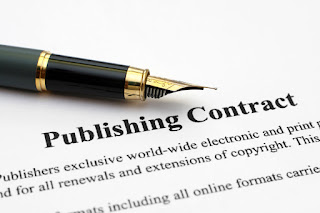Last
weekend, I took an excellent all-day class at Lighthouse Writers Workshop titled
The Business of Book Publishing. It was
taught by Shana M. Kelly, a literary agent who currently works for Einstein Literary Management. Here are my notes from the class.
The Industry
Over
the years, publishers have merged and merged and merged. Currently, there are
five big publishers:
- Penguin Random House
- Simon & Schuster
- Hachette Book Group
- HarperCollins
- Macmillan
Each
of these publishers has numerous imprints, or trade names that specialize in
various demographic consumer segments. To
publish in any of these big five houses, the writer needs an agent to pitch a
book.
When
trying to market one’s own book, it is recommended to
- First try to find an agent. Decide in advance the level of your tolerance for rejection. Can you handle not hearing from or being out-right rejected by 10 agents or 100 agents?
- If it does not work for you to find an agent, try marketing your book to a medium-size publisher. The medium-size publisher will often work with or without an agent.
- Next, try a small publisher.
- If none of the above work, self-publish your book.
Preparing to Market Your Book
Understand
the market. There are basically three different types of fiction books: Literary,
Upmarket, and Commercial. Into which category would your book fit?
- Literary—Analyzes reality. Often contains social commentary, political criticism, or focus on the human condition. Language and excellent writing are important.
- Upmarket—Character driven. Appropriate for book club discussions. (My personal opinion: These books often become best sellers, but are not enduring like literary books.)
- Commercial—Plain entertainment. Fast paced. Escapism. In the end, everything is tied up in a neat little package of resolution.
Decide
who your reader will be—age, gender, geographic location, education, beliefs,
interests.
Determine
your genre. Research the books that sell in this genre. Are there guidelines,
such as length that you should keep in mind?
I am
currently writing a memoir. There are sub-genres within memoir. I need to be
able to describe how my book fits within those sub-genres.
Research who publishes books like yours.
- Explore websites of the big five publishers
- Go to bookstores
- Engage in social media—follow authors, agents, and publishers on Facebook and Twitter.
- Start a spreadsheet of agents and publishers you want to keep in mind when you are ready to submit your book. In the spreadsheet, include contact information, where you heard the person’s or company’s name, and why you think it might be a good match.
Can
you compare your book to those by other authors? Determine who represents those
authors. Often this information will be listed in the acknowledgements of the
book.
Work
on a pitch and query letter. Have both a verbal and a written pitch prepared,
and make certain they are different from one another.
Submission
Prioritize
agents into groups from most desired/best fit on down. Send your query to 10-15
agents at a time. Be prepared for rejection. Most agents won’t even get back to
you. (They are swamped with work.) If you haven’t heard from anyone in 2-4
weeks, send another batch.
The
query letter
Do not send anything more than a query (such as a summary or manuscript) unless it is requested.
- Do not send a query letter unless your manuscript is ready. Your manuscript needs to be in good condition in case it is requested.
- Be sure to read and follow any submission guidelines on the agent’s website.
- Send the query to a specific person. Before sending, be certain that you have current information as people often change jobs in the publishing industry. Read the agent’s bio. Is there anything that connects you to that person? If so, mention it.
- Tell the agent why you chose him or her.
- The letter should be no longer than one page and should be pasted into an email. Do not send it as an attachment. Many companies have firewalls that will not allow them to open attachments.
- In the query, describe your book. Focus on the most unique, intriguing, or sellable part. Don’t try to tell the whole story. Your main goal is to have the agent want to read more. Show your personality. Say to whom the book would appeal and why someone would want to buy the book.
- Include a couple of sentences about yourself if it is pertinent to the book.
- Include contact information.
Publishing Relationships
An
agent is your business liaison.
- The agent will market your book to publishing companies, then be kept in the loop after that.
- It is best to have an agent with foreign rights as that person will get you a better financial deal than the publisher. Make certain that you choose an agent who has contacts with foreign publishers.
- Once an agent expresses an interest in your query letter, he or she will request either a synopsis or an outline (chapter titles with description of each chapter).
Agents
are knowledgeable about what publishing houses and imprints are accepting what
types of books. The agent will pitch your book to the appropriate editors. Once
a good placement has been found, the editor will make a deal with the agent. A
contract is between you and the publisher, with the agent listed as your
representative.
Most
signing contracts are templates, so there is not a lot of wiggle room. The
agent will also help you through the contract process, including the royalty
structure. A typical starting hardcover royalty is 10%; trade paperback is
7.5%. Royalties usually rise as more books are sold. For instance, they might
rise after 10,000 copies are sold and again after 25,000 copies. Most first
time writers are not printed in hardcover, but go straight to paperback.
Your
agent will take 15% commission out of every check sent to you; 20% for most
subsidiary rights.
Once
the agent sells your book to a U.S. publisher, he or she will work with
sub-agents who sell other rights, such as audio, translations, or TV/film.
You
will be assigned an editor who works with a team of publicists, marketers, and designers.
Your editor will pitch your book to bookstore representatives.
Additional Resources
Websites
- Publisher’s Weekly—Reports on new deals, trends, bestsellers. Some information on the website is free. A subscription is very expensive. You might want to see if your library subscribes to the publication.
- Publisher’s Marketplace—Use to find agent information and publishing news. Some information is free. The site costs $25/month to subscribe and can be done on a month by month basis.








